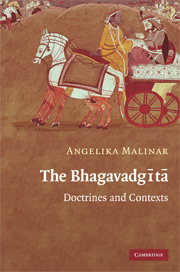Book contents
- Frontmatter
- Contents
- Acknowledgements
- List of abbreviations
- Introduction
- 1 The Bhagavadgītā in the history of research
- 2 Debates over war and peace in the Udyogaparvan of the Mahābhārata
- 3 The doctrines of the Bhagavadgītā
- 4 The doctrines of the Bhagavadgītā: summary and systematic considerations
- 5 Historical and cultural contexts
- Bibliography
- Index
2 - Debates over war and peace in the Udyogaparvan of the Mahābhārata
Published online by Cambridge University Press: 06 January 2010
- Frontmatter
- Contents
- Acknowledgements
- List of abbreviations
- Introduction
- 1 The Bhagavadgītā in the history of research
- 2 Debates over war and peace in the Udyogaparvan of the Mahābhārata
- 3 The doctrines of the Bhagavadgītā
- 4 The doctrines of the Bhagavadgītā: summary and systematic considerations
- 5 Historical and cultural contexts
- Bibliography
- Index
Summary
The BhG is related to other parts and texts of the epic in different ways. It is connected to the religious and philosophical discourses on asceticism, karman and right knowledge, as well as Sāṃkhya and yoga, to teachings on fate and the ages of the world, to the appearances of other gods, the role of the hero and god Kṛṣṇa, and to discourses on dharma in the third and twelfth books of the epic. While parallel passages and similarities in the terminology that connect the BhG to the so-called didactic parts of the epic have attracted a few studies, the relationship to discourses on fate and dharma have been dealt with only rarely. This is also true when it comes to studying the immediate literary context of the BhG, the fifth book of the MBh, the Udyogaparvan (UdP). Seen from the perspective of the debates on war and peace that pervade the UdP, the BhG can be regarded as a continuation or even commentary on some of the issues raised in this book. This connection of the BhG to the UdP may have been one reason for including the BhG in this part of the epic, since, for the last time, it addresses the question of why this war has to be waged. The following analysis is based on the extant, critically constituted text of the UdP and thus deals with those dimensions of meaning that were established by the time of the final redaction of the epic.
- Type
- Chapter
- Information
- The BhagavadgitaDoctrines and Contexts, pp. 35 - 53Publisher: Cambridge University PressPrint publication year: 2007



